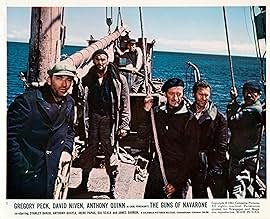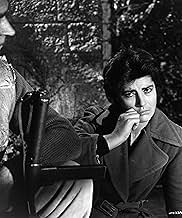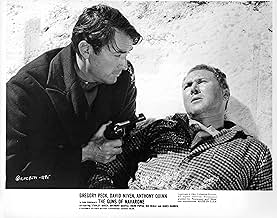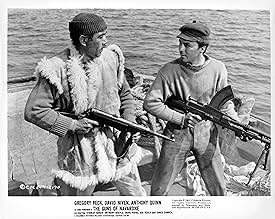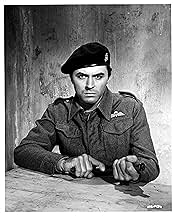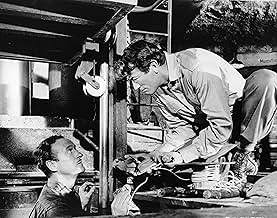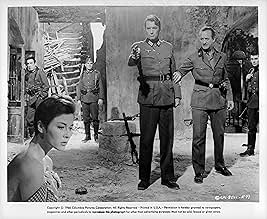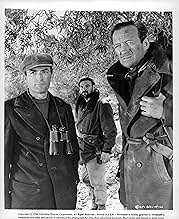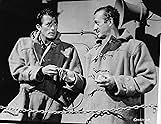Uma equipe britânica é enviada para atravessar o território grego ocupado e destruir a localização massiva de armas alemãs que dominam um canal marítimo chave.Uma equipe britânica é enviada para atravessar o território grego ocupado e destruir a localização massiva de armas alemãs que dominam um canal marítimo chave.Uma equipe britânica é enviada para atravessar o território grego ocupado e destruir a localização massiva de armas alemãs que dominam um canal marítimo chave.
- Direção
- Roteiristas
- Artistas
- Ganhou 1 Oscar
- 4 vitórias e 12 indicações no total
- Direção
- Roteiristas
- Elenco e equipe completos
- Produção, bilheteria e muito mais no IMDbPro
Avaliações em destaque
What makes the film especially good is the crisp dialogue, lines that point up the moral and philosophical argument at the heart of the film and which resonate today as much as then:
Mallory: The only way to win a war is to be just as nasty as the enemy. The one thing that worries me is we're liable to wake up one morning, and find we're even nastier than they are.
Franklin: I can't say that worries me!
Mallory: Well, you're lucky.
Good performances abound, but the best by far is David Niven's Cpl. Miller, a complex character whose smooth front and witty banter conceals much of the conflict of the film. It's he who tangles most often with Gregory Peck's Mallory, and has at least three scenes in the film that are top-rate. We may like Miller because he keeps things humming and provides welcome comic relief, but he's no less the center of the film than Peck or Anthony Quinn, the two well-cast leads whose relationship is enriched, at least from our remove, by the unique vow Stavros has made to Mallory about the unsettled business between them.
The plot is a thing of beauty, moving with all the synchronicity and clever precision of a diabolical cuckoo clock. The special effects have suffered more than a bit from the march of time (though one should remember that was the only part of the film that won an Oscar in 1962). Some process shots are cringe-inducing now. But the pace is still gripping and the payoff spectacular. Here's the film that was the template to every popcorn actioner that came after, its imprint recognizable on everything from the James Bond movies to "Star Wars" to Indiana Jones. That's impressive, but more so is that "Guns" remains as entertaining as any one of them, and more thrilling than most.
Remember those?
When those two German cannons stretched across the screen, they must have been at least eighty feet long. The special effects of films in those days might have been primitive compared to now, but those days had a trick or two up their sleeve to make the most of them, that we can no longer experience.
And outdoor theaters might as have well have been invented and built for this movie. I can't remember a more suspenseful cinematic experience in my whole life-- or a more dramatic night out with Dad. I was glad that he was there, just a reassuring foot or two away, in case the terror became unbearable.
So it surprised me to learn here that Guns of Navarone appeared only in 1961. That would make me twelve or thirteen years old, not eight. If I remember it so vividly, how could I be so wrong about the time? Perhaps this is further testimony to its impact-- how small and vulnerable it can make one feel in its sweep of events.
This simplistically summarizes the moral dilemmas at the heart of Alistar MacLean's classic novel and the superb Carl Forman film from which followed. The Guns Of Navarone at first looks like a basic mission - in 1943 a key channel in the Aegean Sea is commanded by two gigantic German siege batteries on the island of Navarone; these guns prevent the reinforcement of a British island garrison nearby, and if the garrison falls, it will persuade Turkey to join the Axis powers, an outcome Berlin is counting on as the war in Russia has turned against it with the defeat at Stalingrad.
The guns cannot be bombed by air, despite heroic efforts by the RAF, and so is brought in a key Allied operative who has been working in occupied Crete since its fall to the Germans in 1941. Captain Keith Mallory not only can speak the languages of the area with superb fluence, he is "Keith Mallory, the Human Fly," the best mountaineer in the world. He feels he cannot climb the 400 foot precipice atop which the German batteries sit, but he likes nothing better than "a well-organized setup" upon seeing that he has no choice.
With the help of his closest combat comrade Stavro (Anthony Quinn), Mallory is assigned with Major Roy Franklin to ferry British commandos - one of the a wise-cracking explosives expert, Corporal John Anthony Miller (David Niven)- on the perilous journey to the back door of Navarone. But the infiltration is fraught with danger, and when Franklin is badly injured, the real crest of the story unfolds, the moral dilemmas of the team as they must complete the mission while deciding how to handle an injury they cannot treat.
And as if that were not enough, one of the Greek resistance operatives helping the team turns out to be a traitor after Miller finds his explosive equipment has been tampered with. It leads to yet another of the several arguments that ensue through the film between Miller, the soldier who does not want the responsibilities involved, and Mallory, who is determined to finish the job. While one of the arguments doesn't make much sense - Miller is horrified when Mallory admits lying to Roy Franklin so that upon eventual capture Franklin will give away inaccurate information; this is by far the most humane solution to the intolerable dilemma the team has faced - overall the clash between Mallory and Miller adds enormously to the film's tension, thanks in no small part to the excellent performances of Gregory Peck and David Niven.
The sets and props of the film are superb, and overcome the comparative cheesiness of some of the special effects.
What I noticed on first viewing was how quiet it is. Many scenes take place without dialog or score, merely background noises like wind, feet crunching gravel, and the like. Some of the tensest scenes are made more so by our hearing only what the characters would hear. For example, early on in the film, the lead characters undergo a storm at sea and approach a dangerous narrows, and until the scene's climax, all we hear are howling wind, driving rain, and slamming waves.
A musical score tells viewers how they are supposed to feel and often telegraphs shifts in plot or mood. As used in this film, the absence of music heightens the drama and makes the action more immediate. What score there is is thus more effective, earning its composer an Academy Award.
But specifically this film deals with a pair of menacing looking naval guns embedded in a cliff with a big rock overhang. The RAF can't get at the thing to destroy from air, so a commando team is put together under the charge of Anthony Quayle. A couple of native Greeks are along, Anthony Quinn and James Darren, an explosives man, David Niven, a tough anti-fascist resistance man whose service dates back to the Spanish Civil War, Stanley Baker, and a mountain climber, Gregory Peck.
Peck has to get the team to climb a forbidding cliff which is the only area of the beach the Nazis don't guard because they think nobody can land over there. Peck gets the job done, but Quayle becomes injured and Peck gets the responsibility for the whole mission.
The Guns of Navarone is filled with tension as the men keep getting into and out of one situation after another. The film crackles with excitement and really should be seen on the big screen, it's the only way you can appreciate the special effects which got The Guns of Navarone its Oscar.
The film marked a screen partnership of Gregory Peck and director J. Lee Thompson, they did four films together. Thompson specialized in these action adventure films. Later on Thompson partnered with Charles Bronson in some of his best films of the seventies and eighties.
To get the young into the theater, current teenage heart throb James Darren is in the cast. We even gets to hear him sing in Greek which is in fact Darren's own ancestry. Irene Papas is also in the cast as his older sister and Gia Scala is her silent friend.
Despite setback and betrayal our team continues on. The climax of The Guns of Navarone is exciting and unforgettable and should not be missed.
Você sabia?
- CuriosidadesThis film was the only time that David Niven, a life-long non-smoker, ever smoked cigarettes on-screen.
- Erros de gravaçãoWhen the Germans are searching the gun positions for explosives, German soldiers are using mine detection equipment and sweeping the tracks leading up to the guns. This is a useless activity since the detection equipment is a metal detector and would give off a signal due to the steel rails.
- Citações
Mallory: Can you do anything at all?
Corporal Miller: I don't know. There's always a way to blow up explosives. The trick is not to be around when they go off. But aren't you forgetting something? The lady. As I see it we have three choices. One we can leave her here but there's no guarantee she won't be found, and in her case they won't need a truth drug. Two, we can take her with us, but that would make things worse than they are already. And three... well, that's Andrea's choice, remember?
Mallory: You really want your pound of flesh, don't you?
Corporal Miller: Yes, I do. You see, somehow I just couldn't get to sleep.
Mallory: Well, if you're so anxious to kill her, go ahead!
Corporal Miller: I'm not anxious to kill her, I'm not anxious to kill anyone. You see, I'm not a born soldier. I was trapped. You may find me facetious from time to time, but if I didn't make some rather bad jokes I'd go out of my mind. No, I prefer to leave the killing to someone like you, an officer and a gentleman, a leader of men.
Mallory: If you think I wanted this, any of this, you're out of your mind, I was trapped like you, just like anyone who put on the uniform!
Corporal Miller: Of *course* you wanted it, you're an officer, aren't you? I never let them make *me* an officer! I don't want the responsibility!
Mallory: So you've had a free ride, all this time! Someone's *got* to take responsibility if the job's going to get done! You think that's easy?
Corporal Miller: [shouts] I don't know! I'm not even sure who really is responsible any more.
- Cenas durante ou pós-créditosOpening credits prologue: The first day 02.00 Hours An Allied Airfield somewhere in the Middle East
- Versões alternativasTo receive a 'U' certificate the original UK cinema version was overdubbed to remove all of Barnsby's uses of the word 'bloody' (the word was replaced with the less offensive 'ruddy'), and this same print appeared on early video releases. The film was restored in 1993 and all later widescreen releases feature the full unedited version.
- ConexõesEdited into O Comando 10 de Navarone (1978)
- Trilhas sonorasKaragouna
(uncredited)
Traditional
Principais escolhas
Detalhes
- Data de lançamento
- Países de origem
- Idiomas
- Também conhecido como
- Los cañones de Navarone
- Locações de filme
- Acropolis of Lindos, Rhodes, Grécia(meeting point of party with Maria and Anna)
- Empresas de produção
- Consulte mais créditos da empresa na IMDbPro
Bilheteria
- Orçamento
- US$ 6.000.000 (estimativa)
- Faturamento bruto mundial
- US$ 20.616
- Tempo de duração2 horas 38 minutos
- Mixagem de som
- Proporção
- 2.35 : 1
Contribua para esta página



